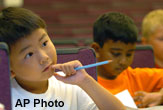
Young children can perform certain kinds of math operations before ever receiving any kind formal math training, a new study reports.
The finding suggests children have an inborn intuition about math that could be used to make learning the real thing in school less painful.
Ask a 5-year old child whether the sum of 13 and 17 is greater or less than 50 and chances are you'll just get a funny look. But the same problem could be presented another way, as a visual problem, and this is what the researchers did.
In one experiment, the children saw 13 blue dots on a computer screen; those were covered, and then they saw 17 blue dots and were forced to keep the running tally in their heads. Then they were shown 50 red dots and asked whether there were more blue dots or red dots.
Presented this way, the children answered correctly about two-thirds of the time that there were more red dots than blue dots.
Sight and sound
In another experiment, the children were asked to compare the number of blue dots on the screen with audible beeps that represented red dots. [See a graphic of experiments.]
Get the world’s most fascinating discoveries delivered straight to your inbox.
Again they were generally able to determine which was more, suggesting they have an abstract notion of numbers that spans multiple sensory modalities, just like adults.
"What's central about numbers for us as adults is that we can apply a number like 7 to a diverse number of things," said Elizabeth Spelke, a psychologist at Harvard University and the principal investigator of the study. "We can say that there are seven dots but also that a horn honks seven times. Although these are different in their sensory qualities, the numbers are the same."
Past studies performed on infants and non-human primates suggests that these abilities are present even before the age of 5.
"The experiments of the infants and the monkeys, I think, make it extremely likely that these abilities are inborn," Spelke said.
While mathematical intuitions have been demonstrated before, the surprising result of this study is that the children could tap into these abilities to solve the types of arithmetic problems they might encounter in school.
Avoiding torture
In the United States, a child's first encounter with math is often in elementary school, and for some, perfecting the ability to add and subtract, multiply and divide will be a long and torturous process.
"A lot of children find symbolic arithmetic quite difficult and tedious, yet the children loved our tasks," Spelke told LiveScience. "They were games, the children were very happy to play them, and they were also they were good at them."
The children did math without even realizing it.
Spelke stresses that more studies will be needed, but she believes teachers could use this knowledge to increase children's confidence in their own math abilities and to make math more fun and engaging.
Abstract ways of teaching math could also be used to ease children into the more difficult symbolic forms of math they will encounter and which they will have to eventually master.
"What our study shows is that children have a fundamental understanding of addition and of numbers and we hope to harness that ability to enhance mathematic instruction," Spelke said.
The finding is detailed in the Sept. 12 issue of the journal for the Proceedings of the National Academy of Sciences.
